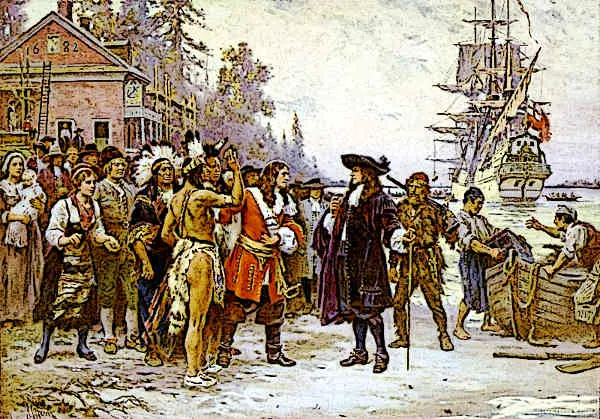Pennsylvania Colony
Pennsylvania Colony – History of ‘Pennsylvania Colony’ in the Colonial Period!
Creation of Pennsylvania – William Penn and Charles II
The Colony and Province of Pennsylvania was set up and ruled over by William Penn – Penn was granted the land by King Charles the II in a Royal Charter. Pennsylvania became a colony first of England in 1682 and a Colony of Great Britain in 1707.
King Charles II granted the land to William Penn to settle a debt owed by the Crown.
Although it was William Penn who govern Pennsylvania it was still subject to the laws of England and the Monarchy.
Pennsylvania is known as being one of the Famous 13 Colonies and also one of the Middle Colonies. All the Middle Colonies were classed as being part of the 13 British Colonies.

The Middle Colonies
Pennsylvania is one of the Middle Colonies that also includes Delaware, New Jersey and New Netherlands which would later become New York after the British took control of the region. The Middle Colonies are all part of the famous 13 Colonies that were all British Colonies.
Pennsylvania – What’s in a Name?
The name Pennsylvania can be split into two parts ‘Penn’ is the the Surname of William Penn and ‘Sylvania’ means Forest lands, so it becomes ‘ Penn Forest or Penn’s Forest Lands!
Who is William Penn?
William Penn (1644 – 1718) was a entrepreneur, writer, philosopher and Quaker. He was a supporter of democracy and religious freedom. He developed good relationships with native american tribes and went on to found, plan and develop the colony of Pennsylvania.
What Type of Colony would Pennsylvania become – Religious Freedom
William Penn had big ideas for Pennsylvania and he seem a totally reasonable type of guy, when he thought about what type of colony he would like Pennsylvania to be, he thought about introducing religious tolerance to all groups, including Religious Societies of Friends and local natives.
This ‘Religious Freedom’ helped make Pennsylvania a popular destination for religious groups who had no religious freedoms in their own countries or in other British colonies such as Protestants.
Land of Abundance – Pennsylvania Forests
Like many of the regions that came under the catchment of the Middle Colonies, Pennsylvania had large forested areas which provided enough trees to create a thriving economy focused around wood production – Pennsylvania also had fertile soils that were perfect for growing important grains such as wheat. The reason for the success of the Pennsylvania colony was largely due to it’s abundant forests which allowed it to become a major exported of wood and wooden products.
Fast Facts Pennsylvania
1681 – William Penn is granted the land to create ‘Pennsylvania’.
1682 – Pennsylvania is a Colony of England
1704 – Dutch land given to Penn was separated and became part of Delaware Colony.
1707 – Pennsylvania is a Colony of Great Britain
1764 – Britain bans western expansion Causing resentment
1773 – Arrest of officer loyal to Pennsylvania causes Revolutionary sentiment to grow
1776 – The Pennsylvania Constitution by locally elected revolutionaries creates the Commonwealth of Pennsylvania.
1776 – Pennsylvania is no longer a Colony of Great Britain
Pennsylvania Colony – Famous People List
Benjamin Franklin
Moved to Philadelphia in 1723 aged 17 – founded the Academy and College of Philadelphia in 1751
Thomas McKean
Born in – officer in the Continental Army during the American Revolution, signed the Declaration of Independence
William Penn
Pennsylvania colony’s founder, son of naval Admiral Sir William Penn.
Robert Morris
Financier of the American Colonial side in the American Revolutionary War
Thomas Paine
Coined the term “United States of America.” wrote the Famous ‘Common Sense pamphlet’ advocating independence from Great Britain, published in 1776
Arthur St. Clair
Famous judge in colonial Pennsylvania, general in the Continental Army and President under the Articles of Confederation
James Wilson
Lawyer who He signed the Declaration of Independence and worked on difficult compromises within the U.S. Constitution